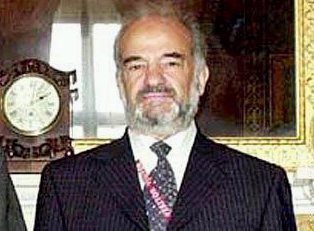
File photo of Ibrahim Jaafari.(Photo: tom.com)
Iraq's winning Shiite list named Ibrahim Jaafari as its candidate for
premiership in the new government, the alliance said Tuesday.
"The United Iraqi Alliance announces the nomination of Dr. Ibrahim Jaafari
unanimously as a candidate for the new prime minister post," head of the
alliance Abdul Aziz al-Hakim told reporters.
Jaafari is head of the Islamist Dawa Party, a major party forming the
alliance besides the Supreme Council for Islamic Revolution in Iraq (SCIRI) led
by Hakim.
He became the only candidate for the alliance after Ahmed Chalabi, head of
the National Congress party, withdrew.
"The idea of a secret voting had been considered but it was no longer
necessary when Ahmed Chalabi withdrew at the last minute," said Jawad Maliki,
spokesman for the Dawa Party.
Chalabi said he dropped out of the race "for the unity of the alliance," but
he did not say if he had been offered a post in the new government.
"Chalabi announced his withdrawal and everyone agreed on Jaafari. Then
Chalabi declared his support to Jaafari," said Haytham al Husaini, a top aide to
the leader of the SCIRI.
At the press conference, Jaafari said the legitimacy of the coming government
"is given by the people of Iraq and the international community."
Jaafari also pledged to call on Iraqis to take part in the political process.
The nomination would make Jaafari face a challenge from incumbent interim
Prime Minister Iyad Allawi.
Allawi was nominated for the same job on Monday by his list, which won only
14 percent of votes in the Jan. 30 elections.
The United Iraqi Alliance won over 48 percent of the vote, enabling it to
garner about 140 seats in the 275-member National Assembly.
Whoever wins the job, to be decided by a confidence voting within the elected
National Assembly, will face a tough transitional period full of social unrest.
"The priorities of the coming government would be security, controlling
borders and reviewing juridical files," said Jaafari.
Jaafari, with strong support from Shiite parties that participated in the
elections, is also blessed by Grand Ayatollah Ali al-Sistani, the most
influential Shiite cleric who played a keyrole in the high turnout of Shiite
voters by calling people to perform their religious duty to cast ballots.
Jaafari also wields some influence among moderate Sunnis, as he sought to
remove their fear of being excluded from the political process in the country.
He promised to bring Sunnis into Iraq's political fold by including them in
the government, parliament and committees in charge of drafting the
constitution, a move differentiating moderate Sunnis from those involved in
killings and boycotting the elections.
Reassuring the Sunni Arabs, Jaafari said he did not want to see a Shiite
regime in Iraq.
Another stern challenge that would present itself if Jaafari assumes the
premiership is the presence of foreign troops in Iraq, especially after many
Iraqis have demanded a timetable for their withdrawal.
A group of factions, led by the Muslim Scholars Association, an influential
Sunni religious committee, called on Tuesday for an announced time-frame of
withdrawal as one of their conditions for joining the process to write the
permanent constitution.
Jaafari's Dawa party, a long standing religious party, is also criticized for
maintaining close ties with Iran and its conservative interpretation of Islam
that ignores the rights of women.



